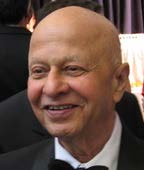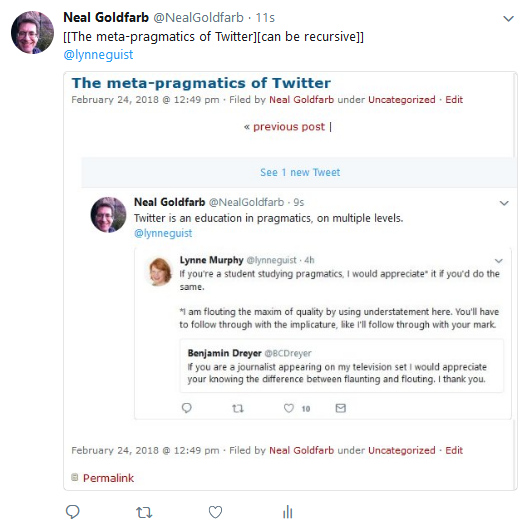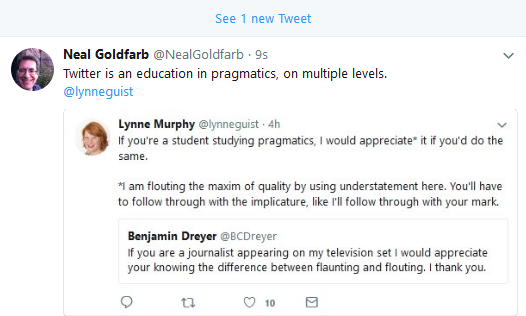Dick Oehrle R.I.P.
 Richard T. Oehrle died on Wednesday. He was one of my oldest friends — I met him in 1965, when I was a first-year undergraduate and neither of us had any idea that we would end up in related fields. (Dick's undergraduate and master's degrees were in English and Comparative Literature, before he started grad school in Linguistics at MIT in 1970.) His many contributions to linguistics can be glimpsed in a list of his publications, from his 1976 PhD dissertation, "The grammatical status of the English dative alternation", to four chapters in a 2003 book co-edited with Geert-Jan M. Kruijff, Resource-Sensitivity, Binding and Anaphora.
Richard T. Oehrle died on Wednesday. He was one of my oldest friends — I met him in 1965, when I was a first-year undergraduate and neither of us had any idea that we would end up in related fields. (Dick's undergraduate and master's degrees were in English and Comparative Literature, before he started grad school in Linguistics at MIT in 1970.) His many contributions to linguistics can be glimpsed in a list of his publications, from his 1976 PhD dissertation, "The grammatical status of the English dative alternation", to four chapters in a 2003 book co-edited with Geert-Jan M. Kruijff, Resource-Sensitivity, Binding and Anaphora.
And one clue to the past 15 years of his career trajectory is offered by his entry in that book's list of "Contributing Authors":
Richard T. Oehrle lives in Berkeley, California, where he frequently contemplates questions of language, logic, and computation while enjoying the beauty of the East Bay hills.
Read the rest of this entry »
Precious Isle Taiwan
From the Twitter account of @zhaoxunlinghun:
https://twitter.com/zhaoxunlinghun/status/966938465106509825
Read the rest of this entry »
An introduction
If you've seen my previous post, SCOTUS cites CGEL (etc.), you may have been surprised to see an unfamiliar name in the byline beneath the title—unfamiliar because you've never heard or me, or because you didn't associate me with Language Log other than as an occasional commenter and a long-time-ago guest poster. Either way, you're probably wondering how I hacked my way into the Language Log server, and whether purloined Language Log emails are going to start being posted on Wikileaks. Or maybe it's fsociety that you're worried about. So let me assure you that no violations of the Computer Fraud and Abuse Act were committed in the making of that post, or of this one.
The explanation for my presence here is that I've accepted an invitation from Mark to be a regular contributor to Language Log. And the purpose of this post is to briefly introduce myself.
Read the rest of this entry »
An experiment with echoing Echos
Henry Cooke (aka "prehensile" on GitHub) has hatched a fascinating techno-artistic experiment. He set up two Amazon Echos to talk back and forth, each repeating a text to the other, with every iteration introducing new errors. His initial inspiration was "I Am Sitting in a Room," a 1969 work of acoustic art by Alvin Lucier, in which a text is recorded and re-recorded until all that is left is the hum of resonant frequencies in the room. (You can watch a 2014 performance with Lucier here.) Rather than replicate Lucier's text, Cooke created new ones for the two Echos to vocalize, with an added wrinkle: iterations of the texts follow the Oulipo S+7 constraint, in which each noun is replaced by another noun appearing seven steps away in the dictionary. You can see the first ten iterations (using Amazon Polly to synthesize different voices) in this video.
Read the rest of this entry »
SCOTUS cites CGEL (Props to Justice Gorsuch and the Supreme Court library)
(Cross-posted from LAWnLinguistics.)
When grammatical questions come up in legal cases, the lawyers and judges will want to support their arguments and analyses with citations to books about grammar. Most of the time, they cite books intended for a general audience, such as the McGraw-Hill Handbook of English Grammar and Usage, The Elements of Grammar, Strunk & White, and various books by Bryan Garner; and books intended for lawyers, such as The Grammar and Writing Handbook for Lawyers and (again) various books by Bryan Garner.
Unfortunately, none of those books gives an adequate description of English grammar, which is a subject that is much more complex than most people realize. If you're looking for a book that can speak about the subject reliably and with authority, the leading candidates are two books that are both known by the initials CGEL.
One is the Cambridge Grammar of the English Language (2002), whose main co-authors are Rodney Huddleston and Geoffrey Pullum. The other is the Comprehensive Grammar of the English Language (1985), by Randolph Quirk, Sidney Greenbaum, Geoffrey Leech, and Jan Svartvik. If you're dubious about my statement regarding the complexity of English grammar, you should note that both of these books are enormous: the text of Huddleston & Pullum exceeds 1,700 pages, and Quirk et al.'s exceeds 1,600 pages. If you ever have occasion to hold a copy of either book in your hands, be careful not to drop it on your toes.
Up until today, Huddleston & Pullum had been cited by U.S. courts 24 times, and Quirk et al., 12 times. The courts in question included the federal courts of appeals for the Fifth and Sixth Circuits and the supreme courts of Colorado, Minnesota, Oregon, Utah, and Washington. But not the U.S. Supreme Court.
Read the rest of this entry »
Flip Donkey Doodleplunk?
Barton Beebe & Jeanne Fromer, "Are We Running Out of Trademarks? An Empirical Study of Trademark Depletion and Congestion", Harvard Law Review, February 2018:
Abstract: American trademark law has long operated on the assumption that there exists an inexhaustible supply of unclaimed trademarks that are at least as competitively effective as those already claimed. This core empirical assumption underpins nearly every aspect of trademark law and policy. This Article presents empirical evidence showing that this conventional wisdom is wrong. The supply of competitively effective trademarks is, in fact, exhaustible and has already reached severe levels of what we term trademark depletion and trademark congestion. We systematically study all 6.7 million trademark applications filed at the U.S. Patent and Trademark Office (PTO) from 1985 through 2016 together with the 300,000 trademarks already registered at the PTO as of 1985. We analyze these data in light of the most frequently used words and syllables in American English, the most frequently occurring surnames in the United States, and an original dataset consisting of phonetic representations of each applied-for or registered word mark included in the PTO’s Trademark Case Files Dataset. We further incorporate data consisting of all 128 million domain names registered in the .com top-level domain and an original dataset of all 2.1 million trademark office actions issued by the PTO from 2003 through 2016. These data show that rates of word-mark depletion and congestion are increasing and have reached chronic levels, particularly in certain important economic sectors. The data further show that new trademark applicants are increasingly being forced to resort to second-best, less competitively effective marks. Yet registration refusal rates continue to rise. The result is that the ecology of the trademark system is breaking down, with mounting barriers to entry, increasing consumer search costs, and an eroding public domain. In light of our empirical findings, we propose a mix of reforms to trademark law that will help to preserve the proper functioning of the trademark system and further its core purposes of promoting competition and enhancing consumer welfare.
Read the rest of this entry »
Taiwan independence posters in polysyllabic characters
Lisa in Toronto found these posters in Taipei at Cafe Macho in November. They say #newyearnewnation in one corner.
Read the rest of this entry »
Face, B face, 13 face, and C face
A student called my attention to this cloying glorification of PRC President Xi Jinping:
Read the rest of this entry »
Anime
Today's Dumbing of Age illustrates, in contemporary Indiana, a point that George Bernard Shaw made about England in 1916: "It is impossible for an Englishman to open his mouth without making some other Englishman hate or despise him."
Mouseover title: "super honestly, she just wants to punch everyone in the face"
Read the rest of this entry »
A constant, guiding presence
 Tomorrow there will be a memorial service for Aravind Joshi, who died on the last day of 2017 ("R.I.P. Aravind Joshi", 1/1/2018). Martha Palmer, who is flying in from Colorado for the event, sent me this remembrance:
Tomorrow there will be a memorial service for Aravind Joshi, who died on the last day of 2017 ("R.I.P. Aravind Joshi", 1/1/2018). Martha Palmer, who is flying in from Colorado for the event, sent me this remembrance:
Aravind was such a constant, guiding presence in my life, from 1980-2017. Always so kind and gentle, and so full of wise and considered advice, on every subject from linguistics and automata theory to life choices and university politics. And changeless. Always there, at every conference, every PI meeting, with a smile, a chuckle and a twinkle in his eye, taking great delight in the vagaries of human nature and the sea changes in government funding.
Read the rest of this entry »




